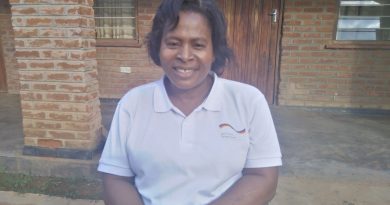Fr Kuppens awarded for fighting for child and women’s rights
By Joseph Kayira
Former Executive Director of the Centre for Social Concern (CfSC) and associate editor of The Lamp magazine, Father Jos Kuppens has been recognized and earned a Human Rights Award of the city of Weimar in Germany for his role in the fight for the rights of children and women especially in the tobacco sector. Fr Kuppens has been recognized together with Felicia Monjeza, another advocate for child and women’s rights working for Catholic Women’s Organization in the country.
While heading the CfSC Fr Kuppens has also been instrumental in fighting evils in the production of tobacco in the process in 2015 producing a study “Tobacco Production and Tenancy Labour in Malawi: Treating Individuals and Families as mere Instruments of Production”.

Among others, the study said: “Tenancy labour in its current practice is characterized by very low-returns and often exploitative arrangements; the labour and economic arrangements done within this system of production, exploit, marginalise and degrade the workers. In this day and age, current tenancy labour practices should be discouraged if not abolished.
“Evidence has shown that the tenancy labour problems cannot simply be wished away, something needs to be done. It is, therefore, of pivotal importance that tenancy labour must be made to conform to some legal framework as a gradual procedure of graduating farmers onto use of other labour means e.g. wage-based or hired labour.”
In the current recognition Fr Kuppens and Monjeza have been recognized at a time Malawi has been into the United Nations’ Human Rights Council for three years (2021-2023). The recognition of the two rights campaigners will inspire others to help children, girls and women mired in a circle of violation of labour and human rights to speak out and help the country to deal with the vice.

Germany ambassador to Malawi Jurgen Borsch told The Nation newspaper of 14 December 2020 that Fr Kuppens and Monjeza are the “frontline of the important fight for the rights of children with a strong focus on girls in rural areas by giving them a voice, a right to education, to equal opportunities, to a self-determined life, leading the way out of poverty.”
Human Rights Award city of Weimar president, Pfarrer Dirk Bingener expressed concern over reports of inhuman and exploitative conditions of workers in tobacco plantations.
Bingener said the conditions in the plantations, largely pose health risks to workers from the toxic effects of tobacco leaves. Additionally, he said he was concerned with the working environment that put girls and women working in tobacco plantations at risk of sexual exploitation and violence.
Monjeza said the violence is evident in Malawi’s economy, which is largely agro-based, where women make up a significant 75 percent of subsistence farmers.
She said despite their contribution to agriculture and the economy, women do not have access or a say on the proceeds emanating from the production they are very much part of.
She told The Nation newspaper: “There is widespread abuse in the commercial crop farms where women are subjected to too much labour that does not correspond with the wages they receive. And they are not accorded maternity-related leave that they rightfully deserve.”
Fr Kuppens said while strides are being made towards relieving the plight of children, girls and women caught up in unfair labour practices in tobacco plantations, the country needs to do more.
He disclosed that over the years, the CfSC has partnered different organizations to bail out workers in tobacco plantations from the pangs of exploitation. Violation of rights of workers in tobacco plantations dates back to days of the one-party state when “promoting critical awareness and its aftermath was quite dangerous.”
“We often had to work with curtains drawn. This was an encounter with brutal power and as even the Catholic bishops of Malawi realised after writing their famous letter of 1992, could be dangerous to human life. Things did change dramatically after the demise of President [Hastings Kamuzu] Banda,” Fr Kuppens said.
Fr Kuppens said at the time, it became gradually clear that even while working for human development, the efforts of people at the grassroots met with resistance from those in power. In order for citizens to enjoy their rights they needed to advocate their cause with those in power. To have effect, these meetings needed to be informed by well researched data, by solid evidence.
“So together with many Missionaries of Africa we started the Centre for Social Concern. It has as its purpose to generate this solid evidence on behalf of the poor. One of its main instruments to do this is the Basic Needs Basket. In an easy to understand manner, following a basket of food needs, the basic cost of food for a month is calculated for a household of six people. Other costs are also calculated like housing and education so as to arrive at a living income,” he said.
Fr Kuppens added: “Over several decades, the Centre for Social Concern has tried to keep the cause of the tenants alive, often with the help of donors. At present it is MISSIO which is preparing to assist both the Centre for Social Concern and the Catholic Women Organization to continue this work with special attention to the situation of women, who suffer most.

“But over all these years since 1995 [may be a little like David confronting Goliath] with the help of the Tobacco Tenants and Associated Workers Union this underprivileged group of people has been organised, evidence has been gathered, studies written, legislation prepared all with the purpose that tenants too will be recognised as full citizens of Malawi, their rights observed, and yes their human dignity promoted, as Children of God.
Fr Kuppens said some of the big actors like British American Tobacco, are facing a lawsuit brought by the Human Rights Law Firm Leigh Day, claiming damages on behalf of more than 2,000 farmers and over 100 children for unjust enrichment; and like the tobacco giant Philip Morris who has promised that by 2025 all those who produce their tobacco shall receive a living income.”
He said at times the cause of the tenants looks like a dark cloud but at other times it looks as if there is a silver lining to the dark clouds adding, “but even while things apparently are moving forward, resting on our laurels would be a grave mistake. Now more than ever we need to keep the cause of tenants on tobacco farms, their families and children under the attention of the world.”
“We hope that the present award ceremony and the plans by Missio to partner with the Centre for Social Concern and the Catholic Women Organization in Malawi will give this final push. It is for me personally a great honour to receive the Human Rights Award of the City of Weimar. It is an honour, which I share with the Centre for Social Concern, with TOTAWU and all those who have supported us over the years and those who are supporting us now,” Fr Kuppens said.




